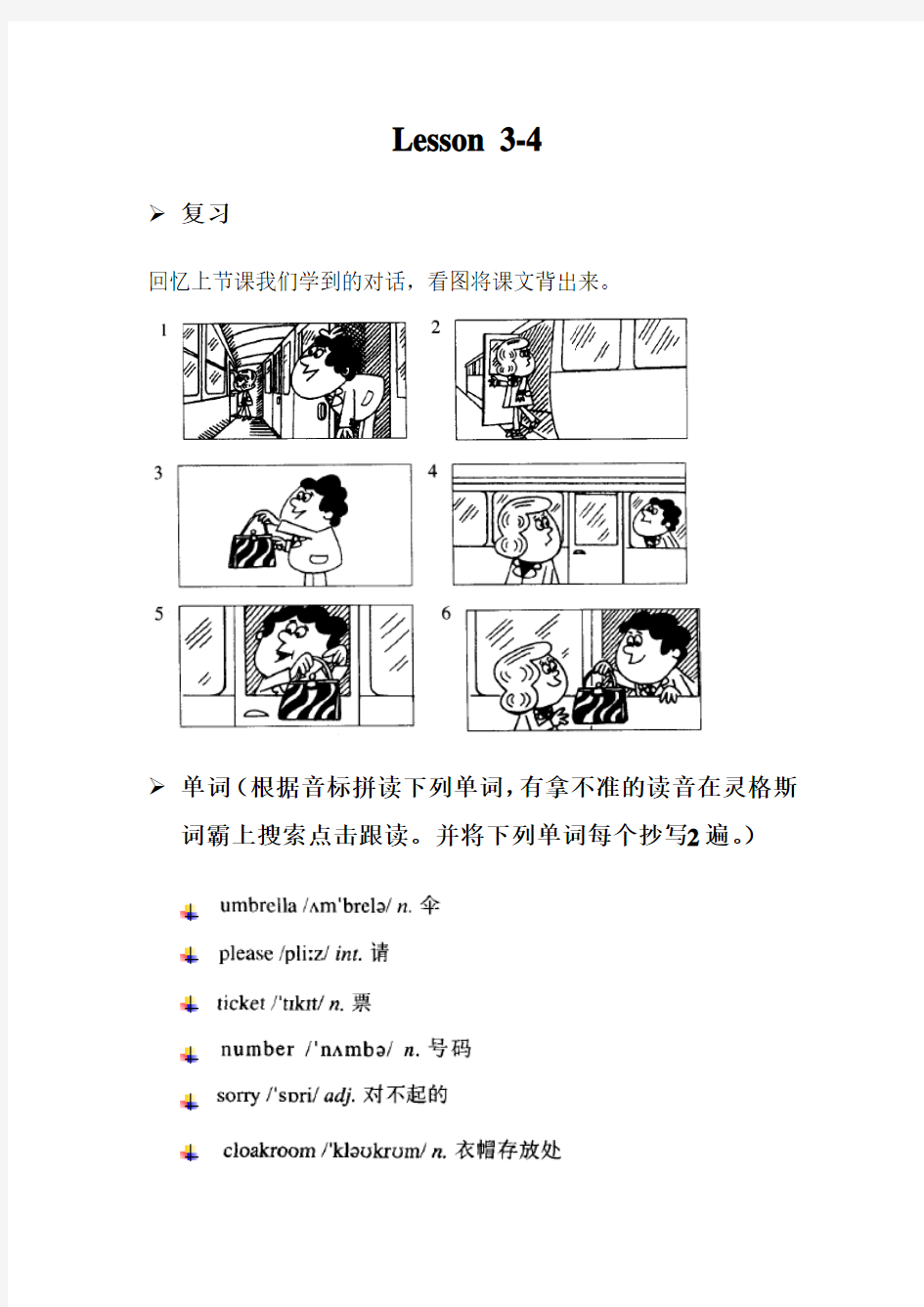新概念英语第一册lesson_3-4课件


Lesson 3-4
复习
回忆上节课我们学到的对话,看图将课文背出来。
单词(根据音标拼读下列单词,有拿不准的读音在灵格斯词霸上搜索点击跟读。并将下列单词每个抄写2遍。)
课文Sorry,sir.(听lesson 3.mp3,朗读下文)这是一则在cloakroom里发生的对话,学习了下文之后,回答这个问题:
Does the man get his umbrella back?这位男士最后要回他的雨伞了吗?
_____________________
My coat and my umbrella please. 请把我的大衣和伞拿给我
Here is my ticket.这是我(寄存东西)的牌子。
Thank you , sir.谢谢,先生。
Number five.是5号
Here`s your umbrella and your coat.这是您的伞和大衣。
This is not my umbrella.这不是我的伞。
Sorry, sir.对不起,先生。
Is this your umbrella?这把伞是您的吗?
No, it isn`t. 不,不是!
Is this it? 这把是吗?
Y es, it is. 是,是这把。
Thank you very much.非常感谢。
再次听录音,结合下图,对应课文中的句子。
再次播放录音,跟着朗读课文。
回到课前的问题:
Does the man get his umbrella back?
Y es, he does.
学习新概念英语第一册lesson 3-4教学视频,结合课件听老师的讲解。 知识点
My coat and my umbrella please.
在英语中,当你想让别人帮你出示什么东西,或让别人把东西递给你,你也可以使用这样的句式。
比如:Tickets, please.请出示您的票。/请买票
A cup of coffee, please.请给我一杯咖啡。
Here is my ticket.
当你把什么东西递给别人,都可以这样用。Here is…
Here`s your umbrella and your coat.这是你的雨伞和大衣。
其中Here`s 是Here is的缩写形式,类似的例子有He`s(He is),It`s (It is)等。缩写形式和非缩写形式在英语的书面用语和口语中均有,但非缩写形式常用于比较正式的场合。
Number five.
请注意汉语和英语中语序的区别,比如“2班”,英语中我们说“Class Two”比如“103房间”,英语中我们说“Room 103”
This is not my umbrella.
这里not加在is的后面表示否定。
例如:This is not my watch.这不是我的手表。
This isn`t my book. 这不是我的书。
This isn`t my coat.这不是我的大衣。
句中isn`t 是is not的缩写形式。
This isn`t my…是本课的重点句型。
Is this your umbrella? No,it isn`t.
在上一课中我们学习了一般疑问句的肯定回答,这里学习它的否定回答:No, it isn`t.这样的回答,也是本课的重点掌握内容。
例如:Is this your coat?这是你的大衣吗?
No,it isn`t. 不是我的。
Sorry = I`m sorry.这是口语中的缩略形式,用于社交场合,向他人表示歉意。
Sir 先生,这是英美人对不相识的男子、年长者或上级的尊称。
Is this it?
本句中的it是代词,指your umbrella.由于前面提到了,后面就用代词it来代替,以免重复。在口语中,如果上下文非常清楚,这时可以用代词避免重复。
数字11-15
除eleven和twelve之外,13-15都是在3、4、5的基础上做了变更加上teen 后缀,其中13由three变形为thir-并加上-teen后缀,14中的four并没有变化,15中的five变形为fif-加-teen后缀。
句型练习
句型:Is this your…?这是你的……吗?
看下图,用否定回答大声回答问题,将对话朗读出来,记忆每幅图片中的名词。
(男士西装)
注意13、14、15号对话中,否定回答No, it isn`t.中,需要根据询问的性别,更换为he isn`t.或she isn`t.
课后练习
抄写下列句子
This is not my umbrella.
Sorry, sir.
Is this your umbrella?
No, it isn`t!
模仿例句回答下列问题,将回答的语句写在作业本上。
例句:Is this your umbrella?
No, it isn`t my umbrella. It`s your umbrella.
1、Is this your dress?
2、Is this your skirt?
3、Is this your shirt?
4、Is this your car?
5、Is this your house?
新概念英语第四册课文word版
—-可编辑修改,可打印—— 别找了你想要的都有! 精品教育资料——全册教案,,试卷,教学课件,教学设计等一站式服务—— 全力满足教学需求,真实规划教学环节 最新全面教学资源,打造完美教学模式
Lesson1 We can read of things that happened 5,000 years ago in the Near East, where people first learned to write. But there are some parts of the world where even now people cannot write. The only way that they can preserve their history is to recount it as sagas--legends handed down from one generation of story-tellers to another. These legends are useful because they can tell us something about migrations of people who lived long ago, but none could write down what they did. Anthropologists wondered where the remote ancestors of the Polynesian peoples now living in the Pacific Islands came from. The sagas of these people explain that some of them came from Indonesia about 2,000 years ago. But the first people who were like ourselves lived so long ago that even their sagas, if they had any, are forgotten. So archaeologists have neither history nor legends to help them to find out where the first 'modern men' came from.
新概念英语113课课件
1 / 4 精品教学课件设计| Excellent teaching plan Lesson 113 Small change讲义重点 一、本课重要单词 conductor: n.售票员; fare:车费,交通工具的票价;ataxifare出租车费;asinglefare单程票价;change: v.兑换(钱),换零(钱)例: Can I change pounds into dollars here? 这里可以把英镑兑换成美元吗? n.零钱,找零: You may keep the change.你可以留下零钱,不用找了。 note: n.纸币; a five-pound note 5英镑纸币; Pay in notes.用钞票付款。passenger : n.乘客,旅客; none: pron.三者或三者以上的人或事物中任何一个都不….例:None of thestudents could answer the question. 没有一个学生会回答那个问题。 None of us has ever been abroad. 我们所有的人都没有出过国,neither : adv.两者都不…(置于单数名词之前) Neither book is bought in Beijing. 2 / 4 这两本书都不是在xx买的。Neither is right.两者都不正确。精品
教学课件设计| Excellent teaching planget off:下车; tramp: n.流浪汉,漂泊者' except : prep.除…之外; 二、本课重要知识点: 1. Have you any small change?您有零钱吗? 在本句中关于have变疑问句的用法需要引起注意: (1)have用作实意动词表示状态,如表示拥有、患病或用于have to 表示“必须”等,在变疑问句时可以直接将have提前,也可根据情况在句首使用do,does,did,例: I have some small change.我有一些零钱,变疑问句: 常用句式:Do you have any small change?您有零钱吗?不常见句式:Haveyou any small change?您有零钱吗?(2)用作实意动词表示动作,如表示“吃(=eat)”、“喝(=drink)”、“度过(=spend)”等,构成疑问式时不能将have提前至句首,而应在句首使用do,does,did,例: He has breakfast at home.变为疑问句: 正确句式: Does he have breakfast at home?他在家吃早餐吗? 错误句式: Has he breakfast at home? 精品教学课件设计| Excellent teaching plan 2. Neither can I.我也不能。在本句中我们要掌握neither与so关于简略回答的用法:当有人说了一句肯定意义上的话,其肯定的
新概念英语一课件(51-99)
51 hans: where do you come from? [h?nz][w?r][du][ju][k?m][fr?m] 汉斯:你是哪国人? dimitri: i come from greece dimitri[a?][k?m][fr?m][ɡri?s] 迪米特里:我是希腊人。 hans: what's the climate like in your country? [h?nz][w?ts][e?][?kla?m?t][la?k][?n][j?r][?k?ntri] 汉斯:你们的国家的气候是怎么样? dimitri: it's very pleasant dimitri[?ts][?v?ri][?pl?znt] 迪米特里:气候非常宜人。 hans: what's the weather like in spring? [h?nz][w?ts][e?][?w?e?][la?k][?n][spr??] 汉斯:春季的天气怎么样? dimitri: it's often windy in march dimitri[?ts][??f(t?)n][?w?ndi][?n][mɑrt?] 迪米特里:3月里常常刮风。 it's always warm in april and may, but it rains sometimes [?ts][??lwe? z][w?rm][?n][?epr?l][?nd][me][b?t][?t][re?n][?s?mta?mz] 4月和5月的天气总暖洋洋的,但有时下雨。 hans: what's it like in summer? [h?nz][w?ts][?t][la?k][?n][?s?m?] 汉斯:夏季的天气如何呢? dimitri: it's always hot in june, july and august,the sun shines every day dimitri[?ts][??lwe?z][hɑt][?n][d?u?n][d???la?][?nd][???ɡ?st] [e?][s?n][?a?nz][??vri][de?] 迪米特里:6月、7月和8月的天气总是炎热的,每天都出太阳。 hans: is it cold or warm in autumn? [h?nz][?z][?t][kold][?r][w?rm][?n][??t?m] 汉斯:秋季的天气是冷还是暖呢? dimitri: it's always warm in september and october,it's often cold in november and it rains sometimes dimitri[?ts][??lwe?z][w?rm][?n][s?p?t?mb?][?nd][ɑ k?tob?][?ts][??f(t?)n][kold][?n][no?v?mb?][?nd][?t] [re?nz][?s?mta?mz] 迪米特里:9月和10月总是很暖和,11月常常就冷了,而且有时下雨。 hans: is it very cold in winter? [h?nz][?z][?t][?v?ri][kold][?n][?w?nt?] 汉斯:冬季的天气很冷吗? dimitri: it's often cold in december, january and february,it snows sometimes dimitri[?ts][??f(t?)n][kold][?n][d??s?mb?][?d??nj???ri][?nd][?f?br???ri][?t][sno?z][?s?mta?mz] 迪米特里:12月、1月和2月常常很冷,有时还下雪。 53 hans: where do you come from? [h?nz][w?r][du][ju][k?m][fr?m] 汉斯:你是哪国人? jim: i come from england. [d??m][a?][k?m][fr?m][???ɡl?nd] 吉姆:我是英国人。 hans: what's the climate like in your country? [h?nz][w?ts][e?][?kla?m?t][la?k][?n][j?r][?k?ntri] 汉斯:你们国家的气候怎么样? jim: it's mild, but it's not always pleasant. [d??m][?ts][ma?ld][b?t][?ts][nɑt][??lwe?z][?pl?znt]
新概念英语第一册lesson 3-4课件
Lesson 3-4 复习 回忆上节课我们学到的对话,看图将课文背出来。 单词(根据音标拼读下列单词,有拿不准的读音在灵格斯词霸上搜索点击跟读。并将下列单词每个抄写2遍。 )
l h n n 课文 Sorry,sir.(听lesson 3.mp3,朗读下文) 这是一则在cloakroom 里发生的对话,学习了下文之后,回答这 个问题: Does the man get his umbrella back?这位男士最后要回他的雨伞了 吗? _____________________ My coat and my umbrella please. 请把我的大衣和伞拿给我Here is my ticket. 这是我(寄存东西)的牌子。Thank you , sir.谢谢,先生。Number five.是5 号 Here`s your umbrella and your coat. 这是您的伞和大衣。 This is not my umbrella. 这不是我的伞。 Sorry, sir.对不起,先生。 Is this your umbrella? 这把伞是您的吗? No, it isn`t. 不,不是!Is this it? 这把是吗? Yes, it is. 是,是这把。 Thank you very much.非常感谢。 再次听录音,结合下图,对应课文中的句子。
再次播放录音,跟着朗读课文。 回到课前的问题: Does the man get his umbrella back? Yes, he does. 学习新概念英语第一册lesson 3-4教学视频,结合课件听老师的讲解。 知识点 My coat and my umbrella please. 在英语中,当你想让别人帮你出示什么东西,或让别人把东西递给你,你也可以使用这样的句式。 比如:Tickets, please.请出示您的票。/请买票 A cup of coffee, please.请给我一杯咖啡。
新概念英语113课课件
精品教学课件设计| Excellent teaching plan Lesson 113 Small change讲义重点 一、本课重要单词 conductor: n.售票员; fare:车费,交通工具的票价;ataxifare出租车费;asinglefare单程票价; change: v.兑换(钱),换零(钱)例: Can I change pounds into dollars here? 这里可以把英镑兑换成美元吗? n.零钱,找零: You may keep the change.你可以留下零钱,不用找了。 note: n.纸币; a five-pound note 5英镑纸币; Pay in notes.用钞票付款。 passenger : n.乘客,旅客; none: pron.三者或三者以上的人或事物中任何一个都不….例:None of the students could answer the question. 没有一个学生会回答那个问题。 None of us has ever been abroad. 我们所有的人都没有出过国, neither : adv.两者都不…(置于单数名词之前) Neither book is bought in Beijing. 这两本书都不是在xx买的。
Neither is right.两者都不正确。精品教学课件设计| Excellent teaching plan get off:下车; tramp: n.流浪汉,漂泊者’ except : prep.除…之外; 二、本课重要知识点: 1. Have you any small change?您有零钱吗? 在本句中关于have变疑问句的用法需要引起注意: (1)have用作实意动词表示状态,如表示拥有、患病或用于have to表示“必须”等,在变疑问句时可以直接将have提前,也可根据情况在句首使用do,does,did,例: I have some small change.我有一些零钱,变疑问句: 常用句式:Do you have any small change?您有零钱吗?不常见句式:Have you any small change?您有零钱吗?(2)用作实意动词表示动作,如表示“吃 (=eat)”、“喝(=drink)”、“度过(=spend)”等,构成疑问式时不能将have 提前至句首,而应在句首使用do,does,did,例: He has breakfast at home.变为疑问句: 正确句式: Does he have breakfast at home?他在家吃早餐吗? 错误句式: Has he breakfast at home? 精品教学课件设计| Excellent teaching plan 2. Neither can I.我也不能。
